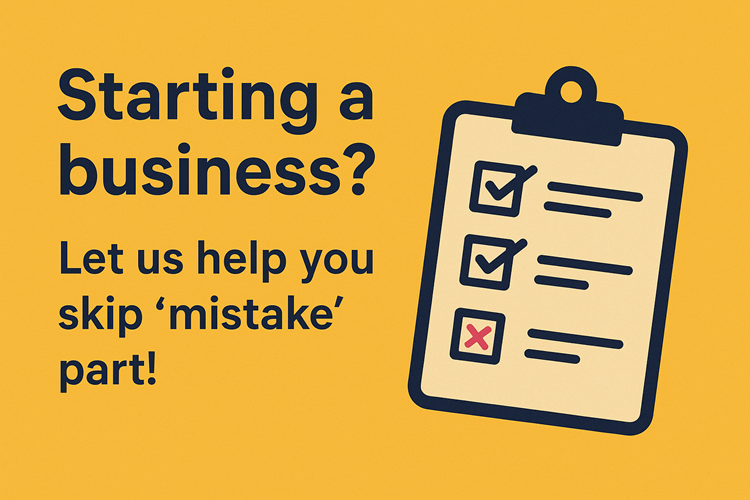Embarking on the journey of starting a business is both thrilling and challenging. While the excitement of bringing your vision to life is undeniable, the reality of managing a business can be overwhelming. In fact, one wrong decision can significantly derail progress. Entrepreneurs often find themselves trapped in a maze of dos and don’ts, struggling to make the right choices in a highly dynamic environment.
According to research, nearly 79% of startups fail within the first four to five years. This staggering statistic is not just a cautionary tale—it’s a reality check. However, understanding the common pitfalls early on can equip aspiring entrepreneurs to navigate their startup journey more effectively.
In this article, we’ll explore some of the most frequent mistakes new businesses make and offer practical advice on how to avoid them.
1. Misjudging Risk: Taking Too Much or Too Little
Many startups are founded by individuals who possess deep knowledge of their industry and a clear understanding of their product. However, being overly risk-averse can lead to missed opportunities, while taking on too much risk can result in costly failures.
Success requires a balanced mindset: be confident in your product and your market understanding, but remain realistic and flexible. Overconfidence can blind you to market shifts, while fear of failure can stop progress altogether.
Evaluate risks carefully, make data-informed decisions, and accept that some level of uncertainty is part of the process. Learning from failure often leads to better long-term success.
2. Lacking a Clear and Strategic Vision
Many great business ideas are born in informal moments—a coffee shop chat or a flash of insight during a routine day. However, a great idea alone is not enough. Lack of clarity, insufficient market research, and a weak understanding of the target audience often result in failure.
If you don’t know who your customer is, why they would buy your product, or how your product solves a real problem, you are setting yourself up for disappointment.
Define a clear mission and vision. Conduct thorough market research, validate your business model, and create a detailed business plan. Ensure your product or service genuinely addresses customer needs.
3. Overlooking Legal and Regulatory Requirements
Legal formalities may seem tedious in the early stages, but neglecting them can be detrimental in the long run. Many startups fail to properly register their business, protect their intellectual property, or comply with local and industry-specific regulations.
Engage legal counsel early to ensure proper business registration, licensing, and compliance. Establish contracts and agreements, particularly with partners, vendors, and employees. Treat legal protection as an investment—not an expense.
4. Scaling Prematurely
Ambition is crucial in business, but expanding too quickly can be harmful. Over-scaling—whether in terms of infrastructure, hiring, or production—without a proven market demand can exhaust resources and put unnecessary pressure on your team.
Focus on steady, sustainable growth. Validate your product-market fit before expansion. Set realistic goals and adjust your growth strategy according to performance data and market conditions.
5. Inadequate Branding and Ineffective Marketing
A product without visibility cannot succeed. Yet, many startups underestimate the importance of branding and marketing. In today’s saturated digital space, standing out requires strategic communication and consistent brand messaging.
Invest in developing a strong brand identity from the beginning. Create a comprehensive marketing plan that includes digital channels, content marketing, and social media engagement. Position your brand effectively to reach and retain your target audience.
6. Overpromising and Under-delivering
In an attempt to win early customers, many startups overpromise features, timelines, or results. Failing to meet those expectations erodes trust and damages reputation—both of which are difficult to rebuild.
Focus on delivering consistent, high-quality value. Be honest about what your product can and cannot do. Building customer trust and loyalty should take precedence over aggressive revenue goals in the early stages.
7. Poor Hiring Decisions and Team Misalignment
A startup’s success largely depends on the strength and cohesion of its team. Hiring too quickly, bringing in the wrong people, or failing to establish a shared vision can disrupt operations and demotivate employees.
Hire deliberately. Look for individuals whose skills align with the company’s needs and whose values match the organization’s culture. Whether it’s a co-founder, partner, or employee—ensure everyone is working toward the same goals.
Always prepare, plan, and persist. Starting a business is both a dream and a journey filled with valuable lessons. The path is rarely straightforward, but being aware of the common pitfalls and planning proactively can dramatically increase your chances of long-term success.
Quick Recap:
- Embrace failure—but don’t underestimate the market. Focus on building credibility and trust over chasing quick revenue.
- Handle legal requirements professionally. Early legal oversight can prevent future complications.
- Be financially responsible. Track expenses, prioritize spending, and remain cash-flow conscious.
- Plan before you launch or expand. Set clear milestones and be data-driven in your decision-making.
- Stay agile with marketing. Adapt to shifting market needs and refine your brand message continuously.
By making strategic decisions, staying informed, and learning from others’ mistakes, you can set a strong foundation for your startup and turn your vision into a sustainable success story.

